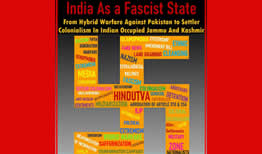Influence of Geo-Political Factors on the Jammu and Kashmir Conflict
Influence of Geo-Political Factors on the Jammu and Kashmir Conflict
Abstract
The changing geopolitical realities of the world often highlight the nature of international power play, which is the pursuit of self-interest. The conflict over the state of Jammu and Kashmir has been a major factor in shaping the dynamics between the two stakeholders, Pakistan and India. However, the issue of Jammu and Kashmir itself has been driven by the interests of major powers seeking to maintain their influence in the region.
Submitted by Wasif Umar
International Relations 4th Semester National Defense University
The division Indian subcontinent when the world was still adapting to the
post-World War farrago. Therefore, the conflict between Jammu and Kashmir got the
attention of the emerging powers. The internationalization of the issue,
instead of resolving the issue, made this conflict a tool for controlling the
power dynamics of the region. Henceforth, understanding the influence of
geopolitical factors on Jammu and Kashmir is necessary for the understanding of
the dispute.
Keywords:
Jammu and Kashmir conflict, Geopolitical factors, India-Pakistan dynamics, International
power play, Regional power dynamics.
Introduction
The history of humankind is teeming with accounts of
the occupation of land by a group of people. With the emergence of new
independent states after the Second World War, the geopolitical structure of
the world has changed. Now the world has become more interwoven and
interconnected. It means that relations between two or more states have effects
on the other states. The conflict between Jammu and Kashmir is one such
international conflict.
The Jammu and Kashmir conflict has influenced the
regional as well as international power structure. A princely state at the time
of partition of British India, became a hotspot for powerplay. It has been the
major bone of contention between the two countries. In 1948, a war happened and
as a result of UN intervention Jammu and Kashmir was divided into two regions,
administrated by India and Pakistan. It has shaped the future of relations
between the two countries but the conflict of Jammu and Kashmir transcends the
bilateral politics of Pakistan and India.
International powers played an important role in
shaping the future of Jammu and Kashmir. During the partition of British India,
the world was almost on the verge of a cold war. Therefore, this dispute became
prey to the geopolitical power play and an instrument for balance of power. The
inclinations of political leaders of Pakistan and India to the USSR introduced
new avenues to proxies of the USA and USSR. China also emerged as a great power
and played an important role in the Jammu and Kashmir conflict. China is also a
party to the dispute as it has claimed over the Ladakh region and hence there
has been a major war, the 1962 Indo-Sino war, and numerous military
confrontations. Pakistan being an independent state at a strategically
significant location was ideal to be a watchdog for the communist USSR. India being
the second largest democracy in the world had its significance. Therefore, the
issue of Jammu and Kashmir transcends the border of Pakistan and India and
holds international significance. The power play has been carried out in the
form of wars, fighting militias, and in the United Nations Security Council
where the USSR has vetoed several resolutions in favor of Jammu and Kashmir. In
this way, the Kashmir issue has played a role in balancing regional as well as
international powers.
In this paper, a detailed account of such
international actors and their geopolitical motives in South Asia and their
subsequent use Kashmir issue to pursue their motives has been given. A nuanced
approach is applied to understand underlying geopolitical factors and their effect
on the conflict between Jammu and Kashmir through the lenses of classical
realism.
1:Geopolitical significance of Kashmir
In
contemporary history, the dispute over Jammu and Kashmir is among the most
intricate and protracted territorial conflicts. It is crucial to investigate
the conflict's historical foundations and comprehend the geopolitical
significance that has made it a focal point for regional and international
powers to completely comprehend the current conflict and its ramifications.
1.1
A peek into the history
Maharaja Hari Singh reigned over Jammu and Kashmir,
a princely state that existed before the 1947 division of British India. In
contrast to other areas, Kashmir has enormous geopolitical significance due to
its advantageous location bordering Afghanistan, China, Pakistan, and India.
The state was a place of confluence as well as conflict since it was a
microcosm of the various cultures, faiths, and ethnic groups that make up South
Asia. Princely nations were offered the
choice to join Pakistan or India, or to stay independent, as the British
prepared to leave India. As a result of the Maharaja's initial hesitancy,
tensions increased as both India and Pakistan attempted to annex Kashmir
because of its strategic significance. A lengthy battle was inevitable given
the Pakistani tribe's eventual invasion and the Maharaja's choice to join
India.
Religious identity was a major factor in the formation of India and Pakistan
during the turbulent, violent, and enormous exodus that followed the partition
of British India. With a majority of Muslims and a Hindu king, Kashmir becomes
a hot spot. Maharaja Hari Singh signed the Instrument of Accession on October
26, 1947, agreeing to join India with the provision that Kashmir would maintain
its status quo. Pakistan opposed this accession, seeing it as a betrayal of the
fundamental ideas guiding the divide.
When the
first Indo-Pakistani conflict broke out in 1947–1948, the UN became involved.
After a truce was mediated in 1949, the Line of Control (LoC) was established,
dividing Kashmir into regions under the administrations of Pakistan and India.
Nevertheless, the UN resolutions that demanded a plebiscite to let the Kashmiri
people choose their destiny were never completely carried out, which resulted
in an unresolved conflict. The geopolitical significance of Kashmir goes well
beyond the competition between Pakistan and India. It is a crucial geopolitical
intersection point for East, Central, and South Asia.
Due to its topography, which is abundant in natural
resources and provides important routes over the Himalayas, it is a valuable
asset. The worldwide conflict between the US and the USSR during the Cold War
increased the relevance of Kashmir. South Asia was important to both nations'
strategic objectives. Pakistan became an important ally of the United States,
which aimed to oppose Soviet hegemony in the area, as a result of its closeness
to the USSR. Under Prime Minister Jawaharlal Nehru, India adopted a
non-alignment policy but looked to the Soviet Union for diplomatic and military
backing, especially in the Kashmir dispute.
1.2. International actors in Kashmir
The Kashmir conflict has been characterized by the
participation of foreign entities. The permanent members of the Security
Council's veto power is the main reason why the UN, despite its best efforts,
has not been able to resolve the conflict. For example, the Soviet Union
consistently exercised its veto power to thwart resolutions that it saw as
being detrimental to India, so guaranteeing that the conflict would stay a
bilateral rather than an international one.
The intricacy of the battle increased with China's involvement.
China's
position as a third party in the Kashmir issue was cemented after the 1962
Sino-Indian War, which was fought over disputed lands in the Aksai Chin area of
Ladakh. China's strong links to Pakistan and its claim to portions of Ladakh
further complicated the issue. A major component of China's Belt and Road
Initiative (BRI), the China-Pakistan Economic Corridor (CPEC) crosses through
Gilgit-Baltistan, a province that India claims as its own but which Pakistan
governs. This has increased tensions between China and India and brought
attention to the area on a global scale.
The stability of South Asia has been significantly impacted by the conflict in
Kashmir. As a result, there have been three significant wars between India and
Pakistan (1947–1948, 1965, and 1971), several military stalemates, and a
continuous insurgency inside the area under Indian administration. With both
India and Pakistan testing nuclear weapons in 1998, mostly as a deterrent
against one another, the conflict has also served as a stimulus for the spread
of nuclear weapons throughout South Asia.
Kashmir has come to represent greater instability in
the area and has the potential to spark larger confrontations involving several
major international countries. Due to the region's contested status, several
nations and non-state entities have supported different militant organizations,
turning it into a theater of operations for proxy disputes. Making South Asia
one of the most unstable regions in the world, the conflict's unfinished nature
continues to impede efforts to bring about a durable peace in the region.
2. Power dynamics and Kashmir
Power is the pivot on which everything hinges
The realities
of the world are regulated by those who acquire power. Therefore, like any
other significant conflict, the war in Kashmir has captured the interest and
participation of significant international powers. The dispute's course has
been determined over decades by the interests of the US, the USSR, and China.
These factors have affected regional politics and changed the balance of power
in South Asia. This chapter explores how these foreign players have
historically impacted the Kashmir dispute and how they still have a strategic
bearing on the area now.
2.1. USA and Kashmir
The United States has had a strategic interest in South Asia ever since the
struggle in Kashmir began in 1947. As the two superpowers fought for dominance
throughout the Cold War, the area turned into a geopolitical checkerboard for
the USA and the USSR. The United States of America's engagement in Kashmir has
been significantly influenced by its wider strategic objectives in the area,
including its partnerships with Pakistan and India.
To stop communism from spreading during the Cold War, the US forged strong
connections with Pakistan.
Pakistan became an essential partner in the US's
global strategy because of its strategic location at the intersection of the
Middle East, South Asia, and the Soviet Union. Pakistan's membership in the
Southeast Asia Treaty Organization (SEATO) and the Central Treaty Organization
(CENTO), two US-led military alliances aimed at limiting communism,
strengthened ties between the two countries. Despite originally backing a
referendum in Kashmir by UN resolutions, the United States' strategic alliance
with Pakistan evolved, becoming increasingly focused on struggles against the
Cold War rather than resolving the dispute of Kashmir.
However, India's stance with the Non-Aligned
Movement (NAM) posed a distinct difficulty for the United States. India was
officially non-aligned, but the USA was suspicious of India's close ties to the
USSR. During the Cold War, the US avoided openly criticizing Indian policy and
instead focused on keeping a regional conflict from turning into a worldwide
one, even while it abstained from helping India in Kashmir. Because it was more
concerned with keeping South Asia balanced than it was with resolving the
Kashmir conflict, the United States tended to adopt a neutral posture to
preserve its strategic interests in both nations.
2.2. Politics of the Reds
The Soviet Union, India's strategic partner, was a major player in the Kashmir dispute. Early in the 1950s, the USSR became involved by starting to help India militarily and economically. The Indo-Soviet Treaty of Peace, Friendship, and Cooperation, which was signed in 1971, was the result of this relationship and had a major influence on both the geopolitics of South Asia and the Kashmir dispute. India's position on Kashmir has always had the support of the USSR, both militarily and politically. India's standing in the area was enhanced in the 1960s and 1970s when the Soviet Union gave India backing and cutting-edge military hardware.
Similarly, the Soviet Union
used its veto power in the UN to thwart resolutions that criticized India's
stance on Kashmir.
Whereas the USSR was an ardent ally of the Indian subcontinent, it also sought
to act as a mediator between Pakistan and India. After the Indo-Pakistani War
of 1965, Soviet Premier Alexei Kosygin mediated the Tashkent Agreement of 1966,
which attempted to reduce tensions. The accord accomplished nothing to address
the core problem of Kashmir, even though it called for a restoration to pre-war
boundaries.
However, the Soviet Union's desire to emphasize its position as a
global peace broker and strike a balance between its regional allies and the
larger strategic objective of preserving stability in Asia's south was
noticeable in the way it participated in resolving the dispute.
Russia's role in the violence in Kashmir decreased when the Soviet Union broke
apart. Nonetheless, Russia has continued to uphold India's sovereignty over
Kashmir and has had strong ties with that country. Although Moscow has eschewed
overt engagement in the Kashmir conflict, opting instead for bilateral
diplomacy over multilateral intervention, Russia has remained an important
friend of India as it worked to reestablish itself on the international scene
in the twenty-first century.
2.3. China and Kashmir
China's territorial claims and larger geopolitical
interests in South Asia are the reasons behind its participation in the Kashmir
dispute. China has claimed sovereignty over the Aksai Chin region of Kashmir,
which it conquered during the 1962 Sino-Indian War and is part of Ladakh.
The Kashmir dispute underwent a sea change with the 1962 confrontation between
China and India. China's triumph cemented its authority over Aksai Chin, a
vital plateau between Tibet and China's Xinjiang region. This conflict also
signaled the start of a protracted competition between China and India with
Kashmir being the major bone of contention China's engagement in the war has
been defined by its claims to sections of Ladakh and its strategic interest in
countering India's dominance in the region. China aims to offset India's
dominance in South Asia by allying with Pakistan.
China's approach to the Kashmir dispute has been significantly influenced by
its strategic alliance with Pakistan. China has long been a source of military
assistance, infrastructural investments, and diplomatic support for Pakistan.
Both sides have long-standing military and economic ties. China's strategic
interest in the region is further reinforced by the China-Pakistan Economic
Corridor, a major project of China's Belt and Road Initiative that passes
through Kashmir, which is governed by Pakistan. China's larger objective of
limiting India and growing its power in South Asia is served by its backing for
Pakistan in the Kashmir controversy.
2.4. Kashmir in the post-cold-war structure of
the world
Significant changes in the balance of power in the
world following the conclusion of the Cold War have fresh implications for the
Kashmir conflict. Russia's influence in South Asia decreased with the fall of
the Soviet Union, and the United States became the only superpower in the
world. US foreign policy in South Asia throughout the 1990s was centered on
counterterrorism and nuclear non-proliferation, especially after nuclear tests
were carried out in 1998 by Pakistan and India.
Russia has remained supportive of India in the post-Cold War era, but it has distanced
itself from the Kashmir problem. Russia prioritized its regional interests in
Eastern Europe and the Middle East as it worked to restore its economy and
regain its position as a major player in the world. Russia is still India's
most important defense ally, but its sway over the Kashmir dispute has
diminished.
The ascent of China as a worldwide force
has significantly influenced South Asia. China is becoming a more significant
participant in the Kashmir dispute as it looks to increase its influence
through military build-up in the area and economic initiatives like the
China-Pakistan Economic Corridor (CPEC). China's strategic interests in South
Asia guarantee that it continues to play a significant role in the ongoing
conflict, even as it maintains a careful balance in its ties with both India
and Pakistan.
3:France and India, a New Threat?
France's changing military and geopolitical
connections with India, notably in terms of defense cooperation, have brought a
new dimension to the geopolitics of Kashmir. This chapter will examine the role
of France and France's strengthening connections with India and how they affect
the conflict's trajectory.
France has been one of India's most important
defense allies, and bilateral ties have increased significantly in recent
years. Several important agreements and cooperation, notably in the defense and
nuclear industries, serve to highlight this link. The two nations created a
strategic alliance in 1998, which has since grown into a multifaceted
collaboration that includes defense, counter-terrorism, space, and civilian
nuclear energy.
3.1
Defense cooperation and weapons sales
Defense cooperation is one of the most apparent facets of France's relationship
with India. France has emerged as India's second-largest arms exporter, after
Russia. This defense partnership was solidified in 2016 with the acquisition of
36 Rafale fighter planes from France, which cost roughly $8.7 billion. The
Rafale agreement has not only improved India's air force capabilities but has
also cemented strategic ties between the two countries.
France's defense supplies to India go beyond fighter planes. The two nations
have conducted joint military exercises, including the Varuna naval exercises
and the Garuda air exercises, to improve interoperability between their armed
forces. Furthermore, France has offered India important technology and
platforms, such as Scorpene-class submarines, to strengthen India's naval
capabilities in the Indian Ocean Region (IOR). This defense cooperation is
consistent with France's wider geopolitical goals in the Indo-Pacific, where it
aspires to offset China’s growing influence in the region. France's growing
military connections with India have enormous geopolitical ramifications,
particularly in light of the Kashmir issue. India sees its defense alliance
with France as a way to enhance its security posture against Pakistan and
China. France's support for India's strategic objectives, especially its
position on Kashmir, has been visible in a variety of diplomatic settings. For
example, France has consistently supported India's stance on cross-border
terrorism, which New Delhi accuses Pakistan of financing in Kashmir.
The strengthening of Franco-Indian ties might be viewed as part of a larger
realignment of global powers in the context of the Kashmir issue. France's
assistance for India's military modernization might be viewed as an endorsement
of India's wider geopolitical goals, particularly its stance on the Kashmir
problem. This has resulted in a scenario in which, while not directly
participating in the Kashmir war, France indirectly impacts regional power
dynamics by strengthening India's military capabilities. This has resulted in a
scenario in which, while not directly participating in the Kashmir war, France
indirectly impacts regional power dynamics by strengthening India's military
capabilities.
Conclusion
The author has investigated the multiple facets of the Kashmir conflict, beginning with its historical beginnings and on to an examination of how geopolitical variables continue to impact its course. The participation of major powers like the United States, China, Russia, and, more lately, France has added layers of complication to an already complicated issue. These countries, motivated by strategic interests, have frequently affected the war in ways that are consistent with their larger geopolitical ambitions. With its shifting relations with India and Pakistan, the United States has walked a fine line, backing India's counterterrorism efforts but being cautious to safeguard regional peace. China's engagement, motivated by its strong ties with Pakistan and border issues with India, adds another degree of geopolitical complexity. Meanwhile, Russia's historical relations with India have continued to affect its position on Kashmir, demonstrating the long-lasting legacy of Cold War alliances France's strengthening military and strategic connections with India highlight the indirect but crucial role that global powers play in the Kashmir conflict.
Defense cooperation, weapons agreements, and strategic alliances
between France and India have strengthened India's military capabilities and,
as a result, its position in the Kashmir issue. This link also mirrors a larger
trend in which global powers, albeit not directly involved in the war, impact
its dynamics through their strategic engagement in the region. These
geopolitical factors highlight the fact that the Kashmir dispute is more than
just a bilateral problem between India and Pakistan. Instead, it is a war that
is profoundly interwoven in the larger geopolitical environment, shaped by the
strategic goals of global powers seeking to establish their influence in South
Asia.
Finally,
these geopolitical variables will most likely continue to define Kashmir's
destiny. The engagement of global powers creates new obstacles and chances for
conflict resolution. While their strategic interests may hinder efforts to
reach a peaceful conclusion, they also can put pressure on the parties
concerned to engage in communication and talks. As global power dynamics shift,
the Kashmir conflict will remain a crucial issue, reflecting the region's
larger battles for influence and power.
Related Research Papers




























